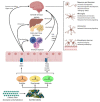Targeting Gut Dysbiosis and Microbiome Metabolites for the Development of Therapeutic Modalities for Neurological Disorders
- PMID: 36200211
- PMCID: PMC10716879
- DOI: 10.2174/1570159X20666221003085508
Targeting Gut Dysbiosis and Microbiome Metabolites for the Development of Therapeutic Modalities for Neurological Disorders
Abstract
The gut microbiota, composed of numerous species of microbes, works in synergy with the various organ systems in the body to bolster our overall health and well-being. The most well-known function of the gut microbiome is to facilitate the metabolism and absorption of crucial nutrients, such as complex carbohydrates, while also generating vitamins. In addition, the gut microbiome plays a crucial role in regulating the functioning of the central nervous system (CNS). Host genetics, including specific genes and single nucleotide polymorphisms (SNPs), have been implicated in the pathophysiology of neurological disorders, including Parkinson's disease (PD), Alzheimer's disease (AD), and autism spectrum disorder (ASD). The gut microbiome dysbiosis also plays a role in the pathogenesis of these neurodegenerative disorders, thus perturbing the gut-brain axis. Overproduction of certain metabolites synthesized by the gut microbiome, such as short-chain fatty acids (SCFAs) and p-cresyl sulfate, are known to interfere with microglial function and trigger misfolding of alpha-synuclein protein, which can build up inside neurons and cause damage. By determining the association of the gut microbiome and its metabolites with various diseases, such as neurological disorders, future research will pave the way for the development of effective preventive and treatment modalities.
Keywords: Alzheimer’s disease; Autism spectrum disorder.; Gut microbiome; Parkinson’s disease; gut dysbiosis; gut metabolite; neurological disorders; therapeutic modalities.
Copyright© Bentham Science Publishers; For any queries, please email at epub@benthamscience.net.
Conflict of interest statement
The authors declare no conflict of interest, financial or otherwise.
Figures


References
-
- Verhaar B.J.H., Hendriksen H.M.A., de Leeuw F.A., Doorduijn A.S., van Leeuwenstijn M., Teunissen C.E., Barkhof F., Scheltens P., Kraaij R., van Duijn C.M., Nieuwdorp M., Muller M., van der Flier W.M. Gut microbiota composition is related to AD pathology. Front. Immunol. 2022;12:794519. doi: 10.3389/fimmu.2021.794519. - DOI - PMC - PubMed
-
- Eshraghi R.S., Deth R.C., Mittal R., Aranke M., Kay S.I.S., Moshiree B., Eshraghi A.A. Early disruption of the microbiome leading to decreased antioxidant capacity and epigenetic changes: Implications for the rise in autism. Front. Cell. Neurosci. 2018;12:256. doi: 10.3389/fncel.2018.00256. - DOI - PMC - PubMed
-
- Kim C.H., Jung J., Lee Y., Kim K., Kang S., Kang G., Chu H., Kim S.Y., Lee S. Comparison of metabolites and gut microbes between patients with Parkinson’s disease and healthy individuals – a pilot clinical observational study (STROBE compliant). Healthcare (Basel) 2022;10(2):302. doi: 10.3390/healthcare10020302. - DOI - PMC - PubMed

